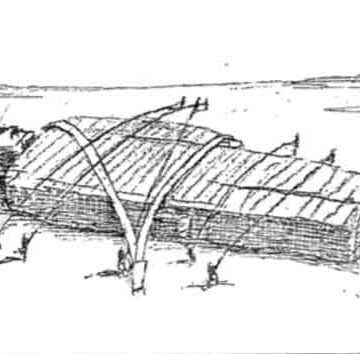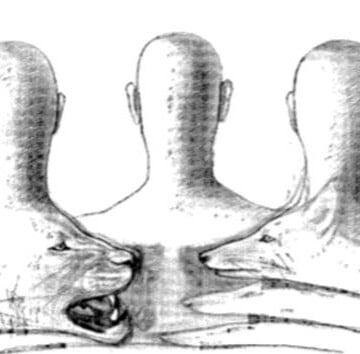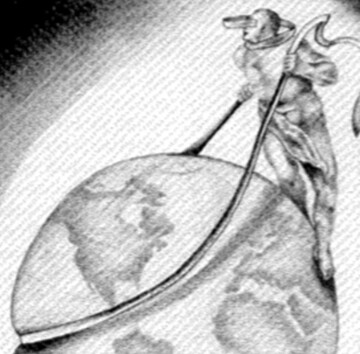No small irony attended the announcement by FBI Director Louis Freeh on July 4 of last year that his bureau was establishing a “legal attache” office in Moscow, and not only because the agency of the U.S. government historically responsible for counterespionage had finally penetrated the capital city of its old adversary. July 4, as...
Author: Samuel Francis (Samuel Francis)
Religious Wrong
Despite the ocean of ink that has been spilled in the last several months on the “religious right,” perhaps the most sensible comment about it, or at least about its journalistic coverage and political analysis, was penned by John F. Persinos in an article published in the magazine Campaigns and Elections last September. “When examined...
Myths to Kill For
“I’ve got a little list, I’ve got a little list,” twitters the Lord High Executioner in a famous line of Gilbert and Sullivan’s Mikado, and indeed these days who doesn’t have one? Abortion protester Paul Hill seems to have had a little list of his own, and early in the morning on July 28 of...
The Abortion Gambit
Trying to be the chief intellectual in the Republican Party is probably a little like trying to be an admiral in the Swiss navy, but in the last year or so, that is more or less what Bill Kristol has become. The son of neoconservative godfather Irving Kristol, young Bill made his bones by billing...
De-Americanization
Although the summer of 1994 produced no entertainments to rival the fun of last year’s Jurassic Park, let alone the previous summer’s Los Angeles riots, it did yield up the brief but amusing manhunt for O.J. Simpson and the edifying spectacle of the wanted killer of his ex-wife and her pretty young companion cruising up...
Secessionist Fantasies
Throughout the first half of the present year, “secession” became the new watchword for a growing number of people on the American right. Economist Walter Williams has written at least two newspaper columns openly advocating secession. Jeffrey Tucker of the Ludwig von Mises Institute describes secession as “the cutting-edge issue that defines today’s anti-statism,” and...
Anarcho-Tyranny, U.S.A.
While violent criminals are given a pass to victimize and reoffend, the everyday American finds himself under the heel of an increasingly invasive and oppressive state.
The New Meaning of Conservatism
One of the most amazing and alarming features of the managerial system in the United States is its capacity to alter the meaning of things without changing their external appearance. This property is essentially what the Old Right political analyst Garet Garrett observed in his insight about “revolution within the form,” a concept he drew...
Forty Years After
Americans have grown fond of celebrating anniversaries of one kind or another. I first noticed this new habit during the national thrombosis over the Statue of Liberty back in 1986, but more recently the habit has swollen into something like an epidemic. In the late 1980’s and early 1990’s, we have endured the anniversaries of...
Beam Us Out
On a morning in April 1990, practitioners of the journalistic craft received in their mail a communication from one Jack Lichtenstein, at that time the director of public affairs for the National Endowment for the Arts, an agency then embroiled in a desperate onslaught by an army of Philistines, voters, and taxpayers who imagined that...
Global Retch
Nearly four years after George Bush, on the eve of the Persian Gulf War, first popularized the expression “New World Order,” is there anyone in the United States who does not greet that phrase with either a grin of sarcasm or a growl of hatred? The answer, in a nutshell, is yes. The expression may...
A Banner With a Strange Device
As the House of Representatives slithered toward its vote on the North American Free Trade Agreement last November, the regiments of lobbyists who were peddling the pact set up their tents in what the New York Times described as “a stately conference room on the first floor of the Capitol, barely an elevator ride away...
The New Populism
In the 12 months since Bill Clinton stumbled into the White House, the most notable political events in the country have consisted neither of his own successes and failures nor of the triumphs and achievements of what purports to be the administration’s loyal opposition in the Republican Party. Mr. Clinton’s performance in his first year...
Winning the Culture War
The first thing we have to learn about fighting and winning a cultural war is that we are not fighting to “conserve” something; we are fighting to overthrow something. Obviously, we do want to conserve something—our culture, our way of life, the set of institutions and beliefs that distinguish us as Americans. But we must...
People of a Different Stripe
Precisely when it first occurred to Illinois Senator Carol Moseley-Braun to lay her traps for the United Daughters of the Confederacy and its iniquitous insignia containing the Confederate “Stars and Bars” we are not given to know, but certainly it was well before the senator, invariably described in the press as the “Senate’s first black...
Stupid and Proud
When the editors of the New Republic told writer Stephen Rodrick to get his cute little fanny down to Washington’s Omni Shoreham Hotel and cover the first conference of Pat Buchanan’s American Cause Foundation last May, Mr. Rodrick must have felt something like a character in Sartre’s “No Exit.” The prospect of idling for an...
Crossing the Line
On April 29, 1993, the Senate Committee on Banking, Housing, and Urban Affairs held a confirmation hearing for Roberta Achtenberg, President Clinton’s nominee for the position of Assistant Secretary of Housing and Urban Development for Fair Housing and Equal Opportunity. Like most nominees, Miss Achtenberg brought along members of her family to lend her support...
A Perpetual Censor
When Supreme Court Justice Byron White announced his retirement from public life in March of this year, a shudder rippled down the spines of Washington conservatives. Previously, when one or another of the Court’s Nameless Nine had declared his intention to quit the pleasures of wrecking the laws and customs of local communities he had...
Flutter at Half-Mast
In the States and in the souls where Confederate flags still fly, they fluttered at half-mast last March for M.E. Bradford, gentleman, scholar, political thinker, and Good Old Rebel, who departed this world too soon at the age of 58. Yet the legacy he left to an America now being reconstructed to suit political correctness...
A Story of the Days to Come
Early in December of last year, while President-elect Clinton was trying to come up with a Cabinet that would “look more like America,” the U.S. Census Bureau published a report that told us what America really looks like and what it will probably look like 60 years from now. Presumably, Mr. Clinton will have departed...
Gangbusters
In The Killer Angels, Michael Saara’s novel about the battle of Gettysburg, there is a character named Colonel Arthur Fremantle, a British military observer attached to the Confederate forces. In part a comic figure, Fremantle is perpetually perplexed by Americans in general and Southerners in particular, and he painfully worries himself and others with his...
Paths of Glory
As I write this column (in late January), the United States has deployed 30,000 troops in Somalia, has just launched new bombing strikes against Iraq, has announced a naval blockade of Haiti, and is debating whether it should send combat forces into the Balkans. By the time you read this column (in late March), there...
The Survival Issue
Long ago in March 1989, in the first column I wrote for this space, I noted that President George Bush shared with only one other American chief executive (namely, Martin Van Buren) the distinction of having been elected to the White House from the office of the Vice-President. I also commented that “the lackluster record...
In Search of Impulses
Some years ago, there was a scries on American television called In Search Of . . . , a documentary show that every week embarked upon some intrepid quest “in search of” such titillating arcana as the Loch Ness Monster, Bigfoot, Flying Saucers, table-rapping, and people who turn into giant mushrooms in the dark of...
The Life of Riley
One good way to ruin your Christmas this year would be to spend the holidays reading a new book entitled Abandoned: The Betrayal of the American Middle Class Since World War II, by two law professors at the University of South Carolina, William J. Quirk and R. Randall Bridwell. Maybe you don’t want to ruin...
An Electorate of Sheep
Even the weariest presidential campaign winds somewhere to the sea, and this month, as the ever dwindling number of American voters meanders into the voting booths, the sea is exactly where the political vessels in which the nation sails have wound up. Water, water everywhere, but not a drop to drink. It is symptomatic of...
Crime Story
Probably not since Margaret Mitchell’s Gone With the Wind has a popular novel influenced Americans as deeply as Mario Puzo’s The Godfather. Appearing in 1969, the book remains, according to the inflated come-on of its publisher’s blurb, “the all-time best-selling novel in publishing history.” If true, that claim in itself is no mean accomplishment, considering...
Mayday
“Revolutions often succeed,” wrote historian Lewis Namier, “merely because the men in power despair of themselves, and at the decisive moment dare not order the troops to fire.” For four days in May last spring, revolution or something frighteningly close to it rapped hard on America’s door. Not only did the “man in power”-namely, President...
The Buchanan Revolution, Part II
The greatest irony of the periodic political revolutions that occur in American democracy is that most of the voters who make them possible have not the foggiest notion of what they are doing. In 1932, Franklin Roosevelt won the White House by promising to balance the budget and reduce the scale and power of the...
The Buchanan Revolution, Part I
Nothing churns the entrails of the professional democracy priesthood more than the rancid taste of a little real democracy. Since one of the main dishes on the 1992 political menu has been a generous serving of authentic popular rebellion, the sages have spent a good part of the last year lurching for their lavatories. The...
Nationalism, Old and New
In the course of American history, nationalism and republicanism have usually been enemies, not allies. From the days of Alexander Hamilton, nationalism has meant unification of the country under a centralized government, the supremacy of the executive over the legislative branch, the reduction of states’ rights and local and sectional parochialism, governmental regulation of the...
New World Baseball
For all the subtle grace that distinguishes Japanese civilization, the esoteric gabble of Western diplomacy seems to elude its leaders. Every few months, some titan of Tokyo pronounces his low opinion of America and Americans, unveiling his view that our schools are dreadful, our racial minorities backward, our politicians crooks, or our workers lazy. Where...
The Jungle of Empire
One of the redeeming features of imperialism is that it makes for great adventure stories. The works of H. Rider Haggard and Rudyard Kipling and the literature of the American West from James Fenimore Cooper to Louis L’Amour would not have been possible without the empires and imperial problems that provide the setting for their...
Unproductive
William F. Buckley, Jr. didn’t have a spy novel or a yachting saga in him one recent week, and the skiing season in Gstaad hadn’t started yet. So he sat himself down and tinkled out a 40,000-word tome tided “In Search of Anti-Semitism.” The article—or book, or monster—consumes the entire issue of the December 30,...
The Middle-Class Moment
With a whoop and a holler, politicians have suddenly discovered that there’s a wild animal called the American middle class prowling around, the voting booths, and officeholders are pounding down the stairs to make sure the rough beast does no damage once it gets inside the house. Almost every issue that has emerged in national...
Fell Out of Ranks
Patrick J. Buchanan had not even formally announced his candidacy for the White House last November than a platoon of the Beltway right suddenly fell out of ranks to denounce him and his challenge to George Bush. Divisive, polarizing, protectionist, nativist, xenophobic, anti-Zionist, anti- Semitic, ultra-nationalist, racist were the predictable sobriquets that buzzed from their...
The Education of David Duke
The time has come, to paraphrase Gaspar Gutman in Dashiell Hammett’s The Maltese Falcon, for plain speaking and clear understanding. Last November, David Duke failed to win the governorship of Louisiana, but he did gain some 39 percent of the popular vote and carried a majority—about 55 percent—of the white vote. What defeated Mr. Duke...
Prophet Sustained
When National Review published a special obituary issue on James Burnham soon after his death in 1987, perhaps the most remarkable contribution came from the pen of John Kenneth Galbraith. The Harvard economist reminisced about the eager welcome with which he and fellow New Dealers in the Roosevelt administration had received Burnham’s The Managerial Revolution:...
The Phrase ‘America First’
No slogan is more conducive to an outbreak of pimples on the cheeks of the establishment than the phrase “America First,” and if it contained no other merit or meaning, that alone might constitute sufficient reason to emblazon it on your bumper stickers. Yet, in the last decade of the 20th century, as One Worlders,...
Knights of the Invisible Empire
Back in the days when Southern merchants had to take the Ku Klux Klan seriously, the knights of the Invisible Empire liked to play a neat little trick on a store owner who had strayed too far from the path of racial rectitude the secret society demanded of him. Several Klansmen in plain clothes would...
Slicing and Twisting
No matter how many curses should be heaped on the head of Thurgood Marshall, recently retired from some 24 years of slicing and twisting the raw meat of the Constitution into whatever ideological pastry suited his appetite of the moment, even his shrillest foes have to acknowledge Mr. Marshall’s eminence in the legal and judicial...
A Defunct Republic
If the American Republic is defunct, and if most Americans no longer subscribe to the classical republicanism that defined the Republic as its public orthodoxy, what is the principal issue of American politics? Ever since the Progressive Era, the issue that has divided Americans into the two political and ideological camps of “right” and “left”...
Not Really a Republic
Just because it looks like a Republic and quacks like a Republic doesn’t mean it’s really a Republic. In ancient Rome, after Julius and Augustus Caesar got through with the civil wars, proscriptions, and purges that spelled death to the remains of the old Roman nobility, the state still looked and quacked like the republic...
Not What People Expect
Lamar Alexander is not what most people expect to emerge from the hills of Tennessee, but in the New World Order, the state that produced Sergeant York, Jack Daniels, the Grand Ole Opry, and the Great Dayton Monkey Trial retains about as much cultural singularity as an enterprise zone in Detroit. Indeed, that’s pretty much...
Define “Imperialism”
Lewis Namier liked to tell the story of an English schoolboy who was asked to define “imperialism” on an examination paper. “Imperialism,” the budding proconsul wrote, “is learning how to get along with one’s social inferiors.” In the Edwardian twilight of the British Empire, that answer might have sufficed to win a scholarship to Balliol,...
Beautiful Losers
When T.S. Eliot said that there are no lost causes because there are no won causes, he probably was not thinking of American conservatism. Nearly sixty years after the New Deal, the American right is no closer to challenging its fundamental premises and machinery than when Old Rubberlegs first started priming the pump and scheming...
Our European Cousins
“All great peoples are conservative . . . “ —Thomas Carlyle What does it mean to be “rightwing”? Since the term and its companion “left-wing” first appeared in the wake of the French Revolution to describe, respectively, those who opposed and those who supported the revolutionary agenda and legacy, one plausible meaning of “right-wing” is...
Preparing for the Presidential Games
The presidential games of 1992 are well more than a year away, but wouldbe Republican gladiators are already measuring George Bush for a quick thrust in the belly. Their plans may be premature. Though the President came close to wrecking his party by breaking his promise against new taxes and may yet make a fool...
The Bit Between Their Teeth
Despite last summer’s brassy pronouncements that the owl had sung her watchsong on the towers of Capitol Hill, the oligarchs of Congress bit the reins in their teeth and lashed their mounts full into the maelstrom of constituents disgusted with pay-raises, privileges, perversion, and pretension. Some 96 percent of the incumbents managed to ride out...
Centuries of Delusion
After centuries of delusion that white people ever accomplished anything worth doing, Euro-Americans are finally learning to grapple with just how worthless they really are. Last November, a conference of the Brahmins of “Afrocentrism” in Atlanta devoted all of a weekend to expounding the much-trumpeted insights that it was really Africans who built the pyramids,...








